2023届高三英语复习之语法专题主谓一致课件(118张)
文档属性
| 名称 | 2023届高三英语复习之语法专题主谓一致课件(118张) | 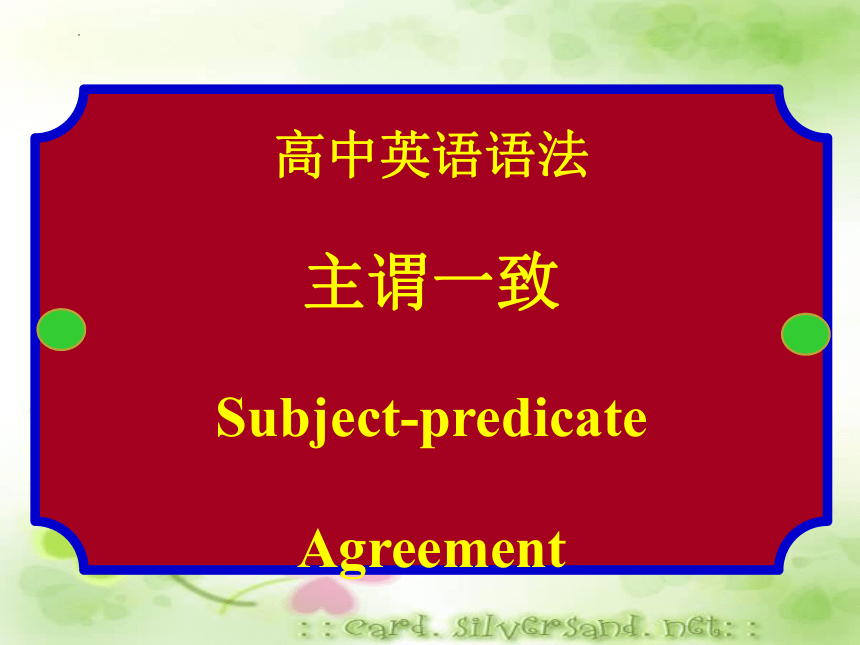 | |
| 格式 | zip | ||
| 文件大小 | 484.8KB | ||
| 资源类型 | 教案 | ||
| 版本资源 | 通用版 | ||
| 科目 | 英语 | ||
| 更新时间 | 2022-07-31 18:54:29 | ||
图片预览

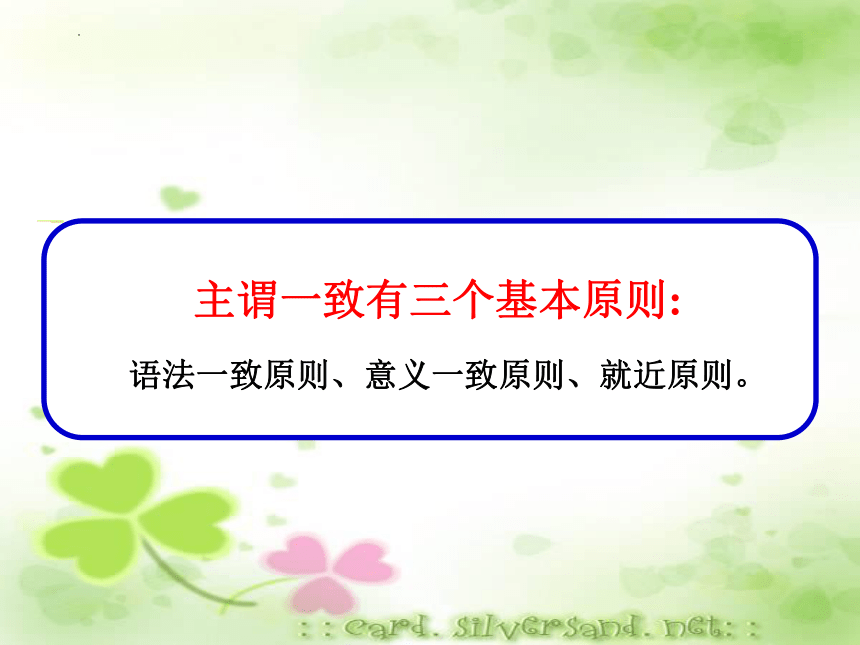
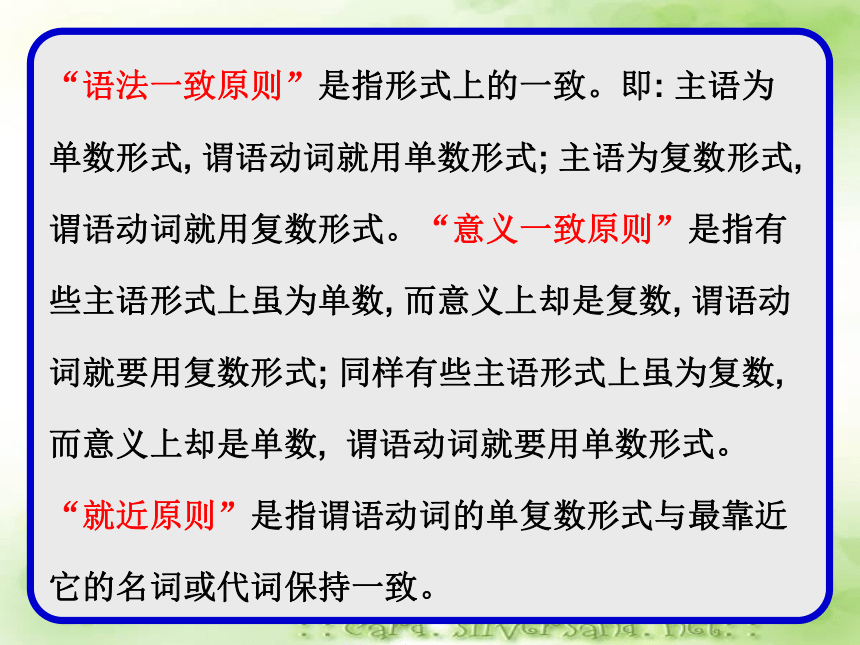

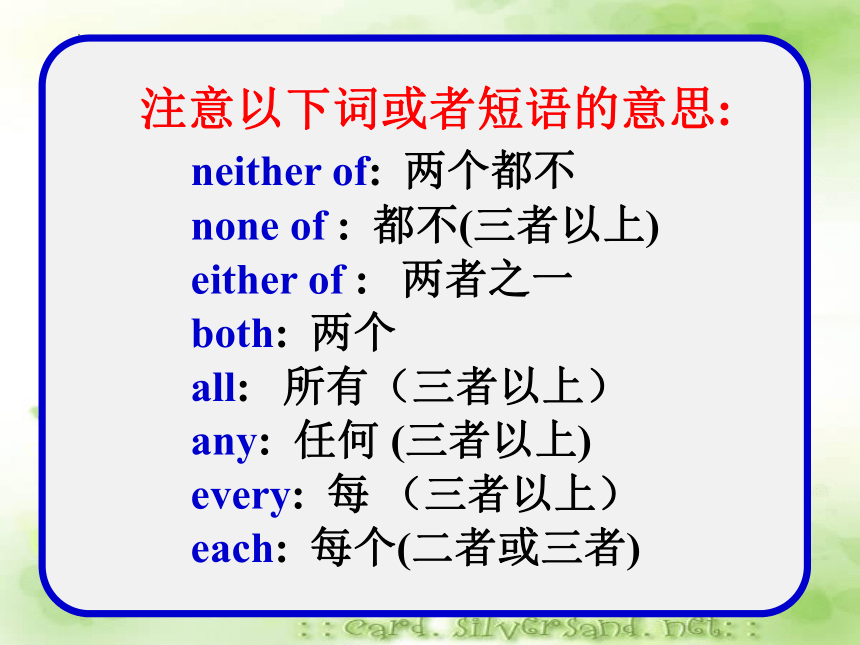



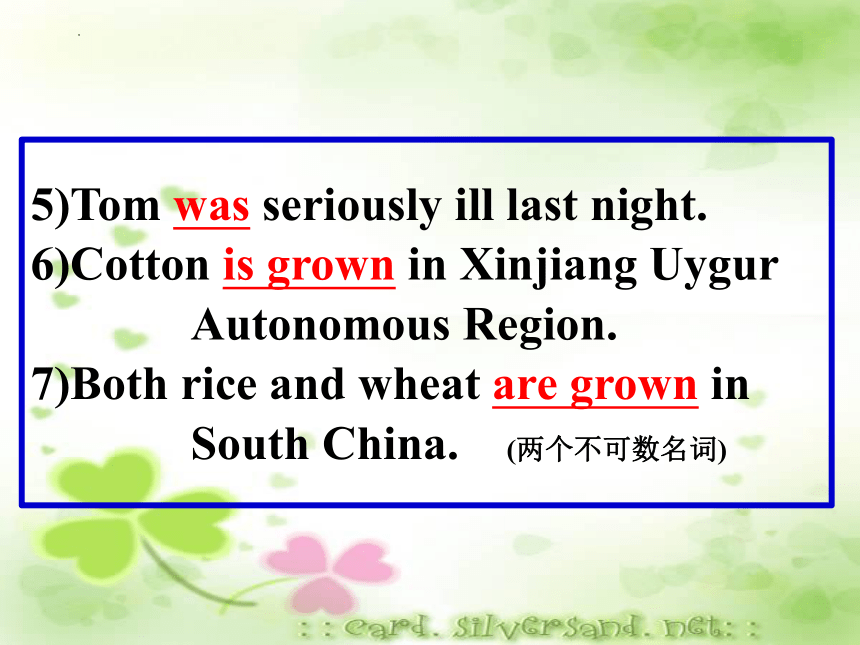

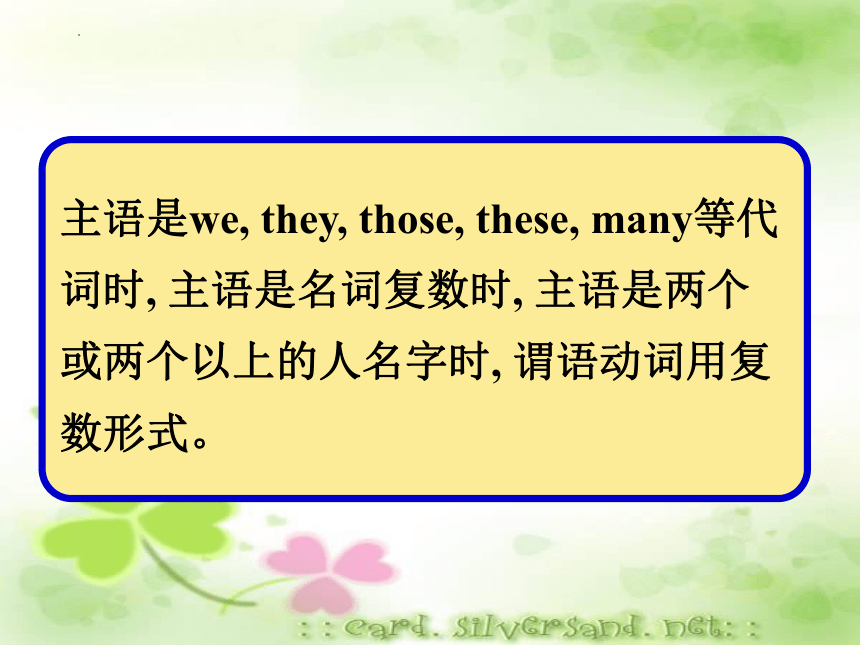

文档简介
(共118张PPT)
高中英语语法
主谓一致
Subject-predicate Agreement
主谓一致有三个基本原则:
语法一致原则、意义一致原则、就近原则。
“语法一致原则”是指形式上的一致。即: 主语为
单数形式, 谓语动词就用单数形式; 主语为复数形式,
谓语动词就用复数形式。“意义一致原则”是指有些主语形式上虽为单数, 而意义上却是复数, 谓语动词就要用复数形式; 同样有些主语形式上虽为复数, 而意义上却是单数, 谓语动词就要用单数形式。“就近原则”是指谓语动词的单复数形式与最靠近它的名词或代词保持一致。
动词单数 is was does has s动词
动词复数 are were do have 动词原形
其余各种动词没有单数复数之分
注意以下词或者短语的意思:
neither of: 两个都不
none of : 都不(三者以上)
either of : 两者之一
both: 两个
all: 所有(三者以上)
any: 任何 (三者以上)
every: 每 (三者以上)
each: 每个(二者或三者)
主谓一致用法(一):
主语是 he, she, it, something,everything, anything, nothing, someone, everyone, anyone, nobody, no one等代词时, 主语是一名词单数时, 主语是一个人名字
时, 主语是一不可数名词时, 谓语动词
用单数形式。
1)She is preparing for her final exams.
2)Now everything has gone very well.
3)In the school nobody knows French.
4)The boy goes to see his grandmother
twice a week.
5)Tom was seriously ill last night.
6)Cotton is grown in Xinjiang Uygur Autonomous Region.
7)Both rice and wheat are grown in South China. (两个不可数名词)
主谓一致用法(二):
主语是we, they, those, these, many等代词时, 主语是名词复数时, 主语是两个或两个以上的人名字时, 谓语动词用复数形式。
1)They were busy picking cotton in the
fields yesterday afternoon.
2)These are the books you should
read in the summer holidays.
3)About eleven fishermen have been
stuck in the middle of the lake.
4)Jerry and Cindy live
at a remote village.
5)The president and his assistant were arrested on charges of corruption and abuse of power.
6)The students each have at least three English-English dictionaries.
7)We/You/They each have been to
Hong Kong.
8)There is a knife, three bowls, five plates on the table.
9)There are three bowls, a knife, five plates on the table.
●all单独作主语时, 要视其在句中的
意义来确定谓语动词用单数形式还
是用复数形式:
1)Now all has been completely changed.
(all指物)
2)All are present at today’s lecture.
(all指人)
主谓一致用法(三):
以下结构表示一类人作主语时,谓语动
词用复数: the living/dead/deceased/sick/
dying/good/healthy/wounded/injured/old/
elderly/aged/young/strong/weak/blind/deaf/
lame/fat/thin/homeless/poor/rich/wealthy/
just/disabled/hungry/unemployed/exploited/
well-educated/fallen等。
1)The living are trying their best to rescue those trapped in the ruins.
2)The disabled are being taken good
care of in China.
3)The wealthy in the USA are against
the plan put forward by the president.
4)The young don’t know what to do
in the future.
5)The injured in the accident have
been taken to the nearest hospital. (很多人)
6)The injured in the accident is an engineer. (一个人)
●下列结构属于表示抽象的概念, 谓语
动词需用单数形式:
the latest (最新情况)
the unknown (未知的事)
the rough (难处理的事)
the worst (最坏的事)
the foreign (外国的事情)
the foreign (外国的事情)
the unreal (不真实的事)
the lovely (漂亮的东西)
the evil (恶)
the ugly (丑)
the mystical (神秘的东西)
the true (真)
the false (假)
1)The beautiful is loved by all people.
2)The ugly is not always bad.
3)The worst is in front of the European countries.
●the above, the below, the former, the latter, the following, such 等
作主语时, 应根据其所指对象
(即表语) 决定谓语动词的单复
数形式。如无上下文且无法根
据表语判断时,则可以当作集合
名词看待。
1)The above/following/below is(are)
the most important fact(facts).
2)Man differs from beasts in that the
former is able to use tools,
while the latter aren’t.
3)Such is his life.
4)Such are her words.
主谓一致用法(四):
集合名词作主语时, 如果表示整体概念, 谓语动词用单数形式; 如果表示成员,谓语动词则用复数形式。常见的这类名词有:
band, club, company, minority, majority,
police, public, audience, grade, class,
team, group, family, army, crowd, youth,
population, government, school, college,
committee, union, enemy, party, couple,
staff, crew, staff, management, personnel
等。
1)Our group are all going to visit the
people living in the jungle.
2)Our group is going to be very tired
and dirty by the afternoon.
3)The government has/have been considering further taxcuts.
4)Team China is/are winning the
football match in no time.
5)The enemy was/were forced to go
back to their own country.
6)The committee has/have decided to close the 39 factories.
7)The school’s staff is/are working on
the fifth floor.
8)The family has lived in the house for over 30 years.
9)The family are going abroad for their winter holidays.
●population表示意义较抽象的“人口”
时, 谓语动词用单数形式; 表示某地
区的全体人时, 为集合名词, 谓语动
词用单数形式复数形式均可。
1)China’s population is by far the
largest in the world.
2)Most of the population at the town
has/have fled their houses.
3)Half the world’s population doesn’t/
don’t get enough food to eat.
4)One third of the population here are
farmers.
主谓一致用法(五):
主语是 people, police, cattle, folk 等
时, 谓语动词用复数形式。
主语是clothes, trousers, pants, shorts,
shoes, boots, socks, stockings, gloves,
goods, glasses, compasses, scissors,
savings, belongings, possessions,
chopsticks 等时, 谓语动词用复数形式;
但这些名词前带上了单位词 pair, kind,
type, sort, suit, series等时, 谓语动词的
数应与单位词保持一致。
1)The police are searching the forest for the eight escaped prisoners.
2)My trousers are more expensive than yours.
3)This pair of trousers is worth fifty pounds.
4)A series of books has been prepared
for the school library.
主谓一致用法(六):
单复数同形的名词作主语时, 要根据上下文及具体意思决定谓语动词的单复数形式。如果这些
名词前有a, such a, this, that, every, each等修饰时,
谓语动词用单数形式; 如果名词前有all, such, these, those, many等修饰时, 谓语动词用复数形式。单复数同形的名词常见的有: sheep, deer, aircraft, means, species, series, works(工厂; 著作; 作品), crossroads, headquarters, Swiss, Chinese, Japanese等。
1)Such a works is to be closed by the local government next year.
2)All the works by the lake are to be closed by the local government next year.
3)There is/are no such deer/sheep in
the mountains.
4)Every possible means has been used
to prevent the air pollution.
5)All means have been tried out
without much result.
主谓一致用法(七):
由and连接两个带the(a或物主代词)的单
数可数名词作主语时, 谓语动词用复数形式; 如果只有前一个名词带the(a或物主代词)时, 谓语动词用单数形式。every/each/no…and every/each/no…结构作主语、谓语动词用单数形式。 many a...and many a...结构作主语, 谓语动词用单数形式。
1)The teacher and singer is speaking at the opening ceremony. (1人)
2)A teacher and singer is speaking at
the opening ceremony. (1人)
3)The teacher and the singer
are dancing at the square. (2人)
4)A teacher and a singer are dancing
at the square. (2人)
5)Every/Each doctor and every/each nurse is very busy at the
present time.
6)No doctor and no nurse is very busy
at the present time.
7)Every man, woman, and child needs
to be sent to the emergency shelter at once.
8)---Did you go to the show last night
---Yeah. Every boy and girl in the
area was invited.
9)It is reported that many a new house
is being built at present in the disaster area.
10)Many a boy and many a girl has
made the same mistake in the math exam.
主谓一致用法(八):
以下短语作主语时, 动词采取就近原则:
either…or…: 不是…就是….
neither/not… nor…: (两者)都不是
not only…but also…: 不但…而且…
not…but…: 不是…而是…
whether…or…: 不管是…还是…
1)Either you or he is not telling
the truth.
2)Either he or you are not telling
the truth.
3)Is either he or you not telling
the truth
4)Are either you or he not telling
the truth
5)Either you or one of your students is
to attend the meeting that is
due tomorrow.
6)Neither the leader nor the workers
are responsible for the heavy losses.
7)Neither the workers nor the leader is responsible for the heavy
losses.
8)Not only you but also she is to blame for the traffic accident.
9)Not only he but also you are to blame for the traffic accident.
10)You or I am to be criticized by the headmaster.
11)I or you are to be criticized by the headmaster.
12)The parents, not their son, were missing.
主谓一致用法(九):
with, along with, together with,
as well as, like, but, except, besides,
including, in addition to, in common
with, rather than, such…as…等结构
连接两个主语时, 谓语动词看前不
看后。
1)I as well as they am too ready to help
you to live through the cold winter.
2)You as well as I are completely
wrong this time.
3)Amy, as well as her brothers, was
given a warm welcome when returning to the village last
week.
4)My daughter like all of you is very
hardworking.
5)The teacher together/along with the
students is discussing Reading
Skills that was newly published
in America.
6)Britain in common with many other
industrialized countries, has experienced major changes over the last 100 years.
7)Such poets as Shakespeare are
widely read, of whose works, however, some are difficult
to understand.
主谓一致用法(十):
number, quantity, amount, variety
等所构成的短语的主谓一致:
a good/great/large/huge quantity of +
复数名词或不可数名词 + 动词单数 (大量)
good/great/large/huge quantities of +
复数名词或不可数名词 + 动词复数
(大量)
a large/huge amount of + 不可数名词
+ 动词单数 (大量)
large/huge amounts of + 不可数名词
+ 动词复数 (大量)
a variety of + 复数名词 + 动词复数
(各种多样)
varieties of + 复数名词 + 动词复数
(各种多样)
a variety of + 不可数名词 + 动词单数
(各种多样)
a number of = many = a good/great many
+ 复数名词 + 动词复数 (许多)
numbers of + 复数名词 + 动词复数
(许多)
the number of + 复数名词 + 动词单数
(…的数字)
a lot of = lots of = plenty of + 复数名词
+ 动词复数 (许多)
a lot of = lots of = plenty of + 不可数名词
+ 动词单数 (许多)
a great/good deal of + 不可数名词 +
动词单数 (许多)
1)A large amount of money is spent
on advertisements every year.
2)Large amounts of special fuel are
needed to launch a rocket into space.
3)A large quantity of oil is stored in
the tanks.
4)A large quantity of air-conditioners
has been sold since May 1.
5)Large quantities of grain/soldiers
have been sent to the
earthquake-stricken area.
6)---Why does the lake smell terrible
---Because large quantities of water
have been polluted.
7)The number of (the) students in
Class Nine is 65. And a number
of them are into the novel.
8)A variety of books have been
published in the last decade.
9)Varieties of these crops have been
collected from around the
district.
主谓一致用法(十一):
时间、钱、距离、重量、度量、容量、温度等作主语时, 谓语动词用单数形式。强调数量, 谓语动词也可用复数形式。
1)Three days was allowed for making
the necessary preparations before the journey.
2)Eight hours of sleep is enough for a
child.
3)500 dollars a month is too much to
pay for such a small room
in this district.
4)12,000 kilometers was too long a
way for the Red Army who didn’t have any modern
traffic.
5)20,000 tons of oil is enough for the
power plant in a month.
6)Forty years have/has gone by since
they got married.
(多少时间) “过去” 的英语表达法:
pass (by) = go on/by;
speed by = race by/past
●加/减/乘/除: 谓语动词用单数形式。
若是“加法”或“乘法”,谓语动
词也可以用复数形式:
1)Ten and/plus six is/are/makes/make
sixteen.
2)One hundred minus thirty is seventy.
3)Twenty times four is/are eighty.
4)Forty divided by eight is five.
主谓一致用法(十二):
politics, mathematics/maths, physics,
economics (经济学), athletics (运动),
statistics(统计学), plastics(塑料)等形式复数意义单数的名词作主语时, 谓语动词用单数形式; 但其中的学科名词表示
“具体的活动、学业、见解、原理、
情况”等时, 谓语动词用复数形式。
1)Maths/Politics/Physics is difficult
to some of the students.
2)If my maths(计算/运算) are right, the
answer is 666.
3)What are the candidate’s politics(政见)?
主谓一致用法(十三):
half of, the rest of, some of, most of,
all of及百分数或分数+ of 等后接名词
作主语时, 谓语动词的形式要根据 of
后的名词而定。
1)Most of the students at the school
have been admitted into universities this year.
2)Most of the meat in the refrigerator
has gone bad.
3)Only 15 percent/two-thirds of the
books are worth reading twice.
4)Around 10 percent of the forest is
destroyed each year.
5)Three fourths of the earth’s surface
is covered with water.
主谓一致用法(十四):
用and连接的两部分表示一事物/东西或一个概念时, 谓语动词用单数形式。
a knife and fork(刀叉)
a needle and thread(针线)
a horse and carriage (马车)
a cart and horse(马车)
a watch and chain(带链的表)
a coat and tie(配有领带的上衣)
bread and butter (涂黄油的面包)
fish and chips(炸鱼和炸薯条)
a cup and saucer (一套杯碟)
truth and honesty (真诚)
cause and effect(因果)
medical help and cure(医疗帮助与治疗)
iron and steel (钢铁)
aim and end (目的)
war and peace(战争与和平)
law and order(法律和秩序)
supply and demand(供求关系)
trial and error(正误实验法)
egg and rice(蛋炒饭)
to love and to be loved(爱与被爱)
early to bed and early to rise(早睡早起)
going to bed early and getting up early(早睡早起)
whisky and soda(威士忌和苏打。指一种酒)
1)There is a knife and fork on the table.
2)The bread and butter was worth
four dollars three years ago.
3)A cart and horse was seen in the
direction of the village.
4)Early to bed and early to rise makes
a man healthy, wealthy and
wise.
5)Going to bed early and getting up
early is a good habit.
6)To love and to be loved is great
happiness.
主谓一致用法(十五):
主语从句、不定式、doing作主语,
谓语动词用单数形式。但两个或两个
以上的主语从句、不定式、doing等作
主语, 表示两个或两个以上的概念或
意义时, 谓语动词用复数形式。
1)Listening to loud music at rock
concerts has caused hearing loss
in some teenagers.
2)Planning so far ahead makes no
sense--so many things will have changed by next year.
3)Going fishing and going sailing are
his favorite sports. (两个意义)
4)To serve the country is our duty .
5)Where and when to build the new
secondary school has not
been decided.
6)When to have the meeting and who
to chair the meeting haven’t
been decided yet. (两个意义)
7)Why he was absent from the lecture
yesterday is being questioned.
8)How and why he left the factory
was a sad story.
9)That they need more time to finish
the work is obvious.
10)What caused the fire and how much
the loss was are still unknown.
(两个意义)
11)What we need is clean water.
12)What we need are English
dictionaries.
●what从句的并列式作主语时,并列
完整式句子用动词复数形式; 并列
缩略式句子用动词单数形式:
1)What he says and what he thinks
have nothing to do with me.
2)What he says and thinks has
nothing to do with me.
主谓一致用法(十六):
the + 姓的复数表示: 夫妇; 一家人。
谓语动词用复数形式。
the Browns: 布朗夫妇; 布朗一家人
the Zhangs: 姓张的夫妇; 姓张的那家人
1)The Blacks are going to Singapore
for their winter vacation
next month.
2)The Greens have been weeding the
wheat/corn fields since
this morning.
3)The Wangs were in Beijing when
you made the phone call yesterday afternoon.
主谓一致用法(十七):
主语是以s结尾的书报名、国名、组织名时, 谓语动词用单数形式; 主语是
以s 结尾的群岛、山脉、瀑布等地理名
称时, 谓语动词用复数形式。
1)Great Expectations was written by
Dickens in 1860.
2)The New York Times believes that
China will be a threat to the USA in the future.
3)The United States is a highly
developed country.
4)The United Nations was founded
on October 24, 1945.
5)The Philippines are in the western
Pacific Ocean.
6)The Andes are the longest mountain
chain on the earth.
7)The Niagara Falls are perhaps the
most famous waterfall in
the world.
主谓一致用法(十八):
a kind/type/sort of + 名词结构, this kind/type/sort of + 名词结构作主语, 谓语动词用单数形式; these/those/many/
several/some kinds of + 名词结构作主
语, 谓语动词用复数形式; 复数名词 +
of this kind/sort等结构作主语, 谓语动
词用复数形式。
1)There is a kind of herb that can cure your bad cold.
2)This kind of man annoys all of us.
3)That type of pickup is no longer popular with the people in
Africa.
4)There are many kinds of snakes on
the island.
5)These kinds of insects are of great
importance to many crops.
6)These types of watches are imported
from Switzerland.
7)Questions of this kind/sort are very
difficult to answer.
8)Persons of this kind are very
dangerous to our society.
主谓一致用法(十九):
more than one + 单数名词、 many a + 单数名词、 one and a half + 复数名词、a/an + 单数
名词 or two等结构作主语, 谓语动词用单数形式; one or two (more) + 复数名词作主语时, 谓语动词用复数形式; the majority/minority作主语, 奥运会作主语, 谓语动词用单数形式复数形式均可以。
1)More than one mistake has already
been found in your composition.
2)Many a student in the school was
sent to the USA to study
medicine last year.
3)One and a half oranges is enough
for the nine-month-old baby.
4)One or two (more) surgeons are
operating on your mother now.
5)A day or two is not enough
for such a task.
6)The majority/minority is/are
in favor of the plan.
7)The 29th Olympic Games was/
were held in Beijing, China.
主谓一致用法(二十):
none, neither代复数名词作主语时, 谓语动词用单数形式复数形式均可; none, neither代不可数名词时, 谓语动词用单数形式; neither + 单数名词, 谓语动词用单数形式; either + 单数名词,谓语动词用单数形式; either of + 复数名词, 谓语动词用
单数形式复数形式均可。
1)Neither road is in good condition.
2)Neither of the roads is/are in good
condition.
3)Neither (of the girls) is/are good
at physics.
4)None of the countries is/are willing
to start the war.
5)None of the donated money was
given to the poor villagers
last month.
6)Either (bridge) has been repaired so
far.
7)Does/Do either of the leaders want
to have a talk next week
8)Have/Has either of the directors
changed their mind since they last met
主谓一致用法(二十一):
定语从句的关系代词that, which, who在定语从句中作主语时, 谓语动词的数应与主句中先行词的数一致。注意: “one of + 复数名词+ who/that/which”结构定语从句, 复数名词是先行词, 故定语从句的谓语动词用复数形式; 但如果one前有this, that, the, the very, the only等修饰时, one是先行词, 故定语从句的
谓语动词用单数形式。
1)Do you know the boy who has won
a gold medal in the Olympics
2)Do you know the boys who have
won gold medals in the Olympics
3)We will buy the house that/which is
located by the lake.
4)We will buy the houses that/which
are located by the lake.
5)Those who want to take the exams,
please sign your names here.
6)He is one of the scientists who/that
have made great contributions
to the country.
7)He is the only one of the scientists
who/that has made great contributions to the country.
Thanks for your watching !
高中英语语法
主谓一致
Subject-predicate Agreement
主谓一致有三个基本原则:
语法一致原则、意义一致原则、就近原则。
“语法一致原则”是指形式上的一致。即: 主语为
单数形式, 谓语动词就用单数形式; 主语为复数形式,
谓语动词就用复数形式。“意义一致原则”是指有些主语形式上虽为单数, 而意义上却是复数, 谓语动词就要用复数形式; 同样有些主语形式上虽为复数, 而意义上却是单数, 谓语动词就要用单数形式。“就近原则”是指谓语动词的单复数形式与最靠近它的名词或代词保持一致。
动词单数 is was does has s动词
动词复数 are were do have 动词原形
其余各种动词没有单数复数之分
注意以下词或者短语的意思:
neither of: 两个都不
none of : 都不(三者以上)
either of : 两者之一
both: 两个
all: 所有(三者以上)
any: 任何 (三者以上)
every: 每 (三者以上)
each: 每个(二者或三者)
主谓一致用法(一):
主语是 he, she, it, something,everything, anything, nothing, someone, everyone, anyone, nobody, no one等代词时, 主语是一名词单数时, 主语是一个人名字
时, 主语是一不可数名词时, 谓语动词
用单数形式。
1)She is preparing for her final exams.
2)Now everything has gone very well.
3)In the school nobody knows French.
4)The boy goes to see his grandmother
twice a week.
5)Tom was seriously ill last night.
6)Cotton is grown in Xinjiang Uygur Autonomous Region.
7)Both rice and wheat are grown in South China. (两个不可数名词)
主谓一致用法(二):
主语是we, they, those, these, many等代词时, 主语是名词复数时, 主语是两个或两个以上的人名字时, 谓语动词用复数形式。
1)They were busy picking cotton in the
fields yesterday afternoon.
2)These are the books you should
read in the summer holidays.
3)About eleven fishermen have been
stuck in the middle of the lake.
4)Jerry and Cindy live
at a remote village.
5)The president and his assistant were arrested on charges of corruption and abuse of power.
6)The students each have at least three English-English dictionaries.
7)We/You/They each have been to
Hong Kong.
8)There is a knife, three bowls, five plates on the table.
9)There are three bowls, a knife, five plates on the table.
●all单独作主语时, 要视其在句中的
意义来确定谓语动词用单数形式还
是用复数形式:
1)Now all has been completely changed.
(all指物)
2)All are present at today’s lecture.
(all指人)
主谓一致用法(三):
以下结构表示一类人作主语时,谓语动
词用复数: the living/dead/deceased/sick/
dying/good/healthy/wounded/injured/old/
elderly/aged/young/strong/weak/blind/deaf/
lame/fat/thin/homeless/poor/rich/wealthy/
just/disabled/hungry/unemployed/exploited/
well-educated/fallen等。
1)The living are trying their best to rescue those trapped in the ruins.
2)The disabled are being taken good
care of in China.
3)The wealthy in the USA are against
the plan put forward by the president.
4)The young don’t know what to do
in the future.
5)The injured in the accident have
been taken to the nearest hospital. (很多人)
6)The injured in the accident is an engineer. (一个人)
●下列结构属于表示抽象的概念, 谓语
动词需用单数形式:
the latest (最新情况)
the unknown (未知的事)
the rough (难处理的事)
the worst (最坏的事)
the foreign (外国的事情)
the foreign (外国的事情)
the unreal (不真实的事)
the lovely (漂亮的东西)
the evil (恶)
the ugly (丑)
the mystical (神秘的东西)
the true (真)
the false (假)
1)The beautiful is loved by all people.
2)The ugly is not always bad.
3)The worst is in front of the European countries.
●the above, the below, the former, the latter, the following, such 等
作主语时, 应根据其所指对象
(即表语) 决定谓语动词的单复
数形式。如无上下文且无法根
据表语判断时,则可以当作集合
名词看待。
1)The above/following/below is(are)
the most important fact(facts).
2)Man differs from beasts in that the
former is able to use tools,
while the latter aren’t.
3)Such is his life.
4)Such are her words.
主谓一致用法(四):
集合名词作主语时, 如果表示整体概念, 谓语动词用单数形式; 如果表示成员,谓语动词则用复数形式。常见的这类名词有:
band, club, company, minority, majority,
police, public, audience, grade, class,
team, group, family, army, crowd, youth,
population, government, school, college,
committee, union, enemy, party, couple,
staff, crew, staff, management, personnel
等。
1)Our group are all going to visit the
people living in the jungle.
2)Our group is going to be very tired
and dirty by the afternoon.
3)The government has/have been considering further taxcuts.
4)Team China is/are winning the
football match in no time.
5)The enemy was/were forced to go
back to their own country.
6)The committee has/have decided to close the 39 factories.
7)The school’s staff is/are working on
the fifth floor.
8)The family has lived in the house for over 30 years.
9)The family are going abroad for their winter holidays.
●population表示意义较抽象的“人口”
时, 谓语动词用单数形式; 表示某地
区的全体人时, 为集合名词, 谓语动
词用单数形式复数形式均可。
1)China’s population is by far the
largest in the world.
2)Most of the population at the town
has/have fled their houses.
3)Half the world’s population doesn’t/
don’t get enough food to eat.
4)One third of the population here are
farmers.
主谓一致用法(五):
主语是 people, police, cattle, folk 等
时, 谓语动词用复数形式。
主语是clothes, trousers, pants, shorts,
shoes, boots, socks, stockings, gloves,
goods, glasses, compasses, scissors,
savings, belongings, possessions,
chopsticks 等时, 谓语动词用复数形式;
但这些名词前带上了单位词 pair, kind,
type, sort, suit, series等时, 谓语动词的
数应与单位词保持一致。
1)The police are searching the forest for the eight escaped prisoners.
2)My trousers are more expensive than yours.
3)This pair of trousers is worth fifty pounds.
4)A series of books has been prepared
for the school library.
主谓一致用法(六):
单复数同形的名词作主语时, 要根据上下文及具体意思决定谓语动词的单复数形式。如果这些
名词前有a, such a, this, that, every, each等修饰时,
谓语动词用单数形式; 如果名词前有all, such, these, those, many等修饰时, 谓语动词用复数形式。单复数同形的名词常见的有: sheep, deer, aircraft, means, species, series, works(工厂; 著作; 作品), crossroads, headquarters, Swiss, Chinese, Japanese等。
1)Such a works is to be closed by the local government next year.
2)All the works by the lake are to be closed by the local government next year.
3)There is/are no such deer/sheep in
the mountains.
4)Every possible means has been used
to prevent the air pollution.
5)All means have been tried out
without much result.
主谓一致用法(七):
由and连接两个带the(a或物主代词)的单
数可数名词作主语时, 谓语动词用复数形式; 如果只有前一个名词带the(a或物主代词)时, 谓语动词用单数形式。every/each/no…and every/each/no…结构作主语、谓语动词用单数形式。 many a...and many a...结构作主语, 谓语动词用单数形式。
1)The teacher and singer is speaking at the opening ceremony. (1人)
2)A teacher and singer is speaking at
the opening ceremony. (1人)
3)The teacher and the singer
are dancing at the square. (2人)
4)A teacher and a singer are dancing
at the square. (2人)
5)Every/Each doctor and every/each nurse is very busy at the
present time.
6)No doctor and no nurse is very busy
at the present time.
7)Every man, woman, and child needs
to be sent to the emergency shelter at once.
8)---Did you go to the show last night
---Yeah. Every boy and girl in the
area was invited.
9)It is reported that many a new house
is being built at present in the disaster area.
10)Many a boy and many a girl has
made the same mistake in the math exam.
主谓一致用法(八):
以下短语作主语时, 动词采取就近原则:
either…or…: 不是…就是….
neither/not… nor…: (两者)都不是
not only…but also…: 不但…而且…
not…but…: 不是…而是…
whether…or…: 不管是…还是…
1)Either you or he is not telling
the truth.
2)Either he or you are not telling
the truth.
3)Is either he or you not telling
the truth
4)Are either you or he not telling
the truth
5)Either you or one of your students is
to attend the meeting that is
due tomorrow.
6)Neither the leader nor the workers
are responsible for the heavy losses.
7)Neither the workers nor the leader is responsible for the heavy
losses.
8)Not only you but also she is to blame for the traffic accident.
9)Not only he but also you are to blame for the traffic accident.
10)You or I am to be criticized by the headmaster.
11)I or you are to be criticized by the headmaster.
12)The parents, not their son, were missing.
主谓一致用法(九):
with, along with, together with,
as well as, like, but, except, besides,
including, in addition to, in common
with, rather than, such…as…等结构
连接两个主语时, 谓语动词看前不
看后。
1)I as well as they am too ready to help
you to live through the cold winter.
2)You as well as I are completely
wrong this time.
3)Amy, as well as her brothers, was
given a warm welcome when returning to the village last
week.
4)My daughter like all of you is very
hardworking.
5)The teacher together/along with the
students is discussing Reading
Skills that was newly published
in America.
6)Britain in common with many other
industrialized countries, has experienced major changes over the last 100 years.
7)Such poets as Shakespeare are
widely read, of whose works, however, some are difficult
to understand.
主谓一致用法(十):
number, quantity, amount, variety
等所构成的短语的主谓一致:
a good/great/large/huge quantity of +
复数名词或不可数名词 + 动词单数 (大量)
good/great/large/huge quantities of +
复数名词或不可数名词 + 动词复数
(大量)
a large/huge amount of + 不可数名词
+ 动词单数 (大量)
large/huge amounts of + 不可数名词
+ 动词复数 (大量)
a variety of + 复数名词 + 动词复数
(各种多样)
varieties of + 复数名词 + 动词复数
(各种多样)
a variety of + 不可数名词 + 动词单数
(各种多样)
a number of = many = a good/great many
+ 复数名词 + 动词复数 (许多)
numbers of + 复数名词 + 动词复数
(许多)
the number of + 复数名词 + 动词单数
(…的数字)
a lot of = lots of = plenty of + 复数名词
+ 动词复数 (许多)
a lot of = lots of = plenty of + 不可数名词
+ 动词单数 (许多)
a great/good deal of + 不可数名词 +
动词单数 (许多)
1)A large amount of money is spent
on advertisements every year.
2)Large amounts of special fuel are
needed to launch a rocket into space.
3)A large quantity of oil is stored in
the tanks.
4)A large quantity of air-conditioners
has been sold since May 1.
5)Large quantities of grain/soldiers
have been sent to the
earthquake-stricken area.
6)---Why does the lake smell terrible
---Because large quantities of water
have been polluted.
7)The number of (the) students in
Class Nine is 65. And a number
of them are into the novel.
8)A variety of books have been
published in the last decade.
9)Varieties of these crops have been
collected from around the
district.
主谓一致用法(十一):
时间、钱、距离、重量、度量、容量、温度等作主语时, 谓语动词用单数形式。强调数量, 谓语动词也可用复数形式。
1)Three days was allowed for making
the necessary preparations before the journey.
2)Eight hours of sleep is enough for a
child.
3)500 dollars a month is too much to
pay for such a small room
in this district.
4)12,000 kilometers was too long a
way for the Red Army who didn’t have any modern
traffic.
5)20,000 tons of oil is enough for the
power plant in a month.
6)Forty years have/has gone by since
they got married.
(多少时间) “过去” 的英语表达法:
pass (by) = go on/by;
speed by = race by/past
●加/减/乘/除: 谓语动词用单数形式。
若是“加法”或“乘法”,谓语动
词也可以用复数形式:
1)Ten and/plus six is/are/makes/make
sixteen.
2)One hundred minus thirty is seventy.
3)Twenty times four is/are eighty.
4)Forty divided by eight is five.
主谓一致用法(十二):
politics, mathematics/maths, physics,
economics (经济学), athletics (运动),
statistics(统计学), plastics(塑料)等形式复数意义单数的名词作主语时, 谓语动词用单数形式; 但其中的学科名词表示
“具体的活动、学业、见解、原理、
情况”等时, 谓语动词用复数形式。
1)Maths/Politics/Physics is difficult
to some of the students.
2)If my maths(计算/运算) are right, the
answer is 666.
3)What are the candidate’s politics(政见)?
主谓一致用法(十三):
half of, the rest of, some of, most of,
all of及百分数或分数+ of 等后接名词
作主语时, 谓语动词的形式要根据 of
后的名词而定。
1)Most of the students at the school
have been admitted into universities this year.
2)Most of the meat in the refrigerator
has gone bad.
3)Only 15 percent/two-thirds of the
books are worth reading twice.
4)Around 10 percent of the forest is
destroyed each year.
5)Three fourths of the earth’s surface
is covered with water.
主谓一致用法(十四):
用and连接的两部分表示一事物/东西或一个概念时, 谓语动词用单数形式。
a knife and fork(刀叉)
a needle and thread(针线)
a horse and carriage (马车)
a cart and horse(马车)
a watch and chain(带链的表)
a coat and tie(配有领带的上衣)
bread and butter (涂黄油的面包)
fish and chips(炸鱼和炸薯条)
a cup and saucer (一套杯碟)
truth and honesty (真诚)
cause and effect(因果)
medical help and cure(医疗帮助与治疗)
iron and steel (钢铁)
aim and end (目的)
war and peace(战争与和平)
law and order(法律和秩序)
supply and demand(供求关系)
trial and error(正误实验法)
egg and rice(蛋炒饭)
to love and to be loved(爱与被爱)
early to bed and early to rise(早睡早起)
going to bed early and getting up early(早睡早起)
whisky and soda(威士忌和苏打。指一种酒)
1)There is a knife and fork on the table.
2)The bread and butter was worth
four dollars three years ago.
3)A cart and horse was seen in the
direction of the village.
4)Early to bed and early to rise makes
a man healthy, wealthy and
wise.
5)Going to bed early and getting up
early is a good habit.
6)To love and to be loved is great
happiness.
主谓一致用法(十五):
主语从句、不定式、doing作主语,
谓语动词用单数形式。但两个或两个
以上的主语从句、不定式、doing等作
主语, 表示两个或两个以上的概念或
意义时, 谓语动词用复数形式。
1)Listening to loud music at rock
concerts has caused hearing loss
in some teenagers.
2)Planning so far ahead makes no
sense--so many things will have changed by next year.
3)Going fishing and going sailing are
his favorite sports. (两个意义)
4)To serve the country is our duty .
5)Where and when to build the new
secondary school has not
been decided.
6)When to have the meeting and who
to chair the meeting haven’t
been decided yet. (两个意义)
7)Why he was absent from the lecture
yesterday is being questioned.
8)How and why he left the factory
was a sad story.
9)That they need more time to finish
the work is obvious.
10)What caused the fire and how much
the loss was are still unknown.
(两个意义)
11)What we need is clean water.
12)What we need are English
dictionaries.
●what从句的并列式作主语时,并列
完整式句子用动词复数形式; 并列
缩略式句子用动词单数形式:
1)What he says and what he thinks
have nothing to do with me.
2)What he says and thinks has
nothing to do with me.
主谓一致用法(十六):
the + 姓的复数表示: 夫妇; 一家人。
谓语动词用复数形式。
the Browns: 布朗夫妇; 布朗一家人
the Zhangs: 姓张的夫妇; 姓张的那家人
1)The Blacks are going to Singapore
for their winter vacation
next month.
2)The Greens have been weeding the
wheat/corn fields since
this morning.
3)The Wangs were in Beijing when
you made the phone call yesterday afternoon.
主谓一致用法(十七):
主语是以s结尾的书报名、国名、组织名时, 谓语动词用单数形式; 主语是
以s 结尾的群岛、山脉、瀑布等地理名
称时, 谓语动词用复数形式。
1)Great Expectations was written by
Dickens in 1860.
2)The New York Times believes that
China will be a threat to the USA in the future.
3)The United States is a highly
developed country.
4)The United Nations was founded
on October 24, 1945.
5)The Philippines are in the western
Pacific Ocean.
6)The Andes are the longest mountain
chain on the earth.
7)The Niagara Falls are perhaps the
most famous waterfall in
the world.
主谓一致用法(十八):
a kind/type/sort of + 名词结构, this kind/type/sort of + 名词结构作主语, 谓语动词用单数形式; these/those/many/
several/some kinds of + 名词结构作主
语, 谓语动词用复数形式; 复数名词 +
of this kind/sort等结构作主语, 谓语动
词用复数形式。
1)There is a kind of herb that can cure your bad cold.
2)This kind of man annoys all of us.
3)That type of pickup is no longer popular with the people in
Africa.
4)There are many kinds of snakes on
the island.
5)These kinds of insects are of great
importance to many crops.
6)These types of watches are imported
from Switzerland.
7)Questions of this kind/sort are very
difficult to answer.
8)Persons of this kind are very
dangerous to our society.
主谓一致用法(十九):
more than one + 单数名词、 many a + 单数名词、 one and a half + 复数名词、a/an + 单数
名词 or two等结构作主语, 谓语动词用单数形式; one or two (more) + 复数名词作主语时, 谓语动词用复数形式; the majority/minority作主语, 奥运会作主语, 谓语动词用单数形式复数形式均可以。
1)More than one mistake has already
been found in your composition.
2)Many a student in the school was
sent to the USA to study
medicine last year.
3)One and a half oranges is enough
for the nine-month-old baby.
4)One or two (more) surgeons are
operating on your mother now.
5)A day or two is not enough
for such a task.
6)The majority/minority is/are
in favor of the plan.
7)The 29th Olympic Games was/
were held in Beijing, China.
主谓一致用法(二十):
none, neither代复数名词作主语时, 谓语动词用单数形式复数形式均可; none, neither代不可数名词时, 谓语动词用单数形式; neither + 单数名词, 谓语动词用单数形式; either + 单数名词,谓语动词用单数形式; either of + 复数名词, 谓语动词用
单数形式复数形式均可。
1)Neither road is in good condition.
2)Neither of the roads is/are in good
condition.
3)Neither (of the girls) is/are good
at physics.
4)None of the countries is/are willing
to start the war.
5)None of the donated money was
given to the poor villagers
last month.
6)Either (bridge) has been repaired so
far.
7)Does/Do either of the leaders want
to have a talk next week
8)Have/Has either of the directors
changed their mind since they last met
主谓一致用法(二十一):
定语从句的关系代词that, which, who在定语从句中作主语时, 谓语动词的数应与主句中先行词的数一致。注意: “one of + 复数名词+ who/that/which”结构定语从句, 复数名词是先行词, 故定语从句的谓语动词用复数形式; 但如果one前有this, that, the, the very, the only等修饰时, one是先行词, 故定语从句的
谓语动词用单数形式。
1)Do you know the boy who has won
a gold medal in the Olympics
2)Do you know the boys who have
won gold medals in the Olympics
3)We will buy the house that/which is
located by the lake.
4)We will buy the houses that/which
are located by the lake.
5)Those who want to take the exams,
please sign your names here.
6)He is one of the scientists who/that
have made great contributions
to the country.
7)He is the only one of the scientists
who/that has made great contributions to the country.
Thanks for your watching !
